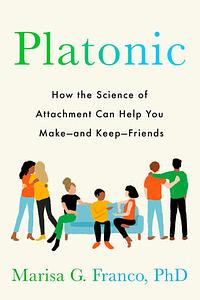Take a photo of a barcode or cover
803 reviews for:
Platonic: How the Science of Attachment Can Help You Make and Keep Friends as an Adult
Marisa G. Franco
803 reviews for:
Platonic: How the Science of Attachment Can Help You Make and Keep Friends as an Adult
Marisa G. Franco
Love a book with a lil personality quiz that can help you figure yourself out. Already had an inkling of what kind of attachment style I have, but I'm gratified both to be right and to see that it's also shifting with time and therapy.
Nothing revolutionary here for me, really; it's mostly reaffirming what I've already learned from years of experience and professional help. The author can dither a bit about how to apply general concepts, but I appreciate that she allows for friendship not being a science (despite the title of the book) — it's a constant negotiation of differing attachment styles, traumas, and personality types, and it can be challenging but also incredibly rewarding.
Overall, this was maybe a 3-starrer for me up until I got to the section about generosity and the misapplication of boundaries. Do you have friends or do you have a loose collection of narcissists who can't be bothered to show up for you!! The phrase "communal boundaries" (meaning boundaries you maintain with care for yourself AND ALSO care for other people) is a game-changer for anyone who's accustomed to hearing from folks that they don't have time for your genuine emotional need because they have a prior engagement (slash they just don't feel like it).
This feels like the ideal book for anyone who's wondering why they don't have deeper friendships and who doesn't know where to start. People who already have them and are generally content: you're doing great, sweetie. You probably don't need to read this.
Nothing revolutionary here for me, really; it's mostly reaffirming what I've already learned from years of experience and professional help. The author can dither a bit about how to apply general concepts, but I appreciate that she allows for friendship not being a science (despite the title of the book) — it's a constant negotiation of differing attachment styles, traumas, and personality types, and it can be challenging but also incredibly rewarding.
Overall, this was maybe a 3-starrer for me up until I got to the section about generosity and the misapplication of boundaries. Do you have friends or do you have a loose collection of narcissists who can't be bothered to show up for you!! The phrase "communal boundaries" (meaning boundaries you maintain with care for yourself AND ALSO care for other people) is a game-changer for anyone who's accustomed to hearing from folks that they don't have time for your genuine emotional need because they have a prior engagement (slash they just don't feel like it).
This feels like the ideal book for anyone who's wondering why they don't have deeper friendships and who doesn't know where to start. People who already have them and are generally content: you're doing great, sweetie. You probably don't need to read this.
This book is so important for adults who just don’t devote the time needed on friendships. Loneliness is rampant and it’s just as detrimental to your health as a poor diet and lack of exercise. It goes into how society puts so much emphasis on family relationships and not enough on the power of friendship. This was really well researched and included some real life examples to illustrate the points. I’d highly recommend.
Enjoyed the merging of stories and psychology research. A lot of the writing didn’t feel like cheesy self-help. And it definitely wasn’t an awkward book about how to make friends. Enjoyed the information, application, and presentation of it.
I liked this and found some powerful advice. We all get lonely and can use help making friends and maintaining good friendships. The power of connections is so important.
“Expressing anger is more likely to benefit a relationship then destroy it.”
“If you don’t have anybody that’s generous and loving and full of grace in your life then go be that in somebody else’s life.”
“What can you bring as an offering? And that’s how community is built….It’s built of the offerings of the generous and the living.”
“Expressing anger is more likely to benefit a relationship then destroy it.”
“If you don’t have anybody that’s generous and loving and full of grace in your life then go be that in somebody else’s life.”
“What can you bring as an offering? And that’s how community is built….It’s built of the offerings of the generous and the living.”
Thoughtful application of a good range of research.
hopeful
informative
reflective
medium-paced
I already want to reread this book. It is fantastic, and I think everyone could learn a lot about friendship and self by reading it. Highly highly recommend.
Probably useful advice in here for people who happen to be similar in personality & social milieu to the author, but I found the tone pretty infantilizing and it didn't get at any of the core things I struggle with when it comes to friendship - namely the way health and work struggles impinge on my limited energy levels leaving me feeling constantly out of the time and energy I want to give to... all the people I love in my life. I suspect ultimately no self-help book can effectively get at these issues - some structural problems just don't have solutions that can be framed as the actions of individuals to change their behavior or outlook.
Oh how I wish I’d had this book in my twenties!! I want everyone I love to read it.
I recommend this book for anyone who has or wants friends. The author provides highlights and examples from her work and her personal life, which makes the scenarios and descriptions come alive, and she bases everything on research.
I listened to the audiobook read by the author and she had a very open, friendly, and warm voice.
I listened to the audiobook read by the author and she had a very open, friendly, and warm voice.



